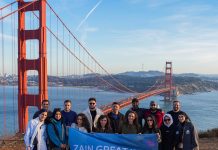
Aware of the importance of the tourism sector for economic recovery, Telefónica will present successful and transformative cases at the Mobile World Congress in Barcelona, presented in the Smart Tourism demo, which help to revolutionise the tourism experience by leveraging the latest technologies.
For an industry as important to economic recovery as tourism, Telefónica is an ally in the exceptional opportunity offered by digital transformation, with which the sector will be able to respond to the new demands of customers in a context in which they demand innovative solutions and models after the outbreak of the pandemic.

Telefónica is committed to creating smart destinations that are safer spaces for visitors. It is also committed to enhancing the value of the destination thanks to the application of technology and fostering greater knowledge of tourists in order to offer increasingly personalised and individualised services.
All of this is reflected in the real success stories that the company will offer at Mobile. These experiences will serve to showcase the solutions and services that are already being applied, and which are the best ambassadors of what Telefónica can do for the sector to accompany it in its digitisation.
Use cases that enhance the tourism experience
The use cases can be seen in the digital twin created by the company to access Mobile virtually and in the transformation booklet that sets out in even more detail the value proposition that the company offers the sector. Among the examples, a simultaneous translation solution for more than 80 languages.
This is a pilot project created in collaboration with Hotel Meliá which, through a mobile application, and thanks to the low latency provided by 5G and edge computing, allows sufficient immediacy to hold a conversation in any of the available languages in real time. In addition, and thanks to deep learning technology, this solution improves and corrects the conversation so that it is completely natural.
In parallel, Telefónica has worked on another experience with Hotel Meliá, exploring the capabilities of network slicing. This consists of providing 5G coverage in buildings where the necessary network capacity is guaranteed to ensure the operation of critical services without affecting the saturation of public networks.
Thus, during peaks of crowds such as events or large congresses, performance is guaranteed for both guests and visitors. After the experience of both projects, Tomeu Fiol, Director Technologies International Global at Hotel Meliá, says: “5G is, without a doubt, one of the technologies that will allow us to enhance the experience of our guests, the core of our business, and improve the efficiency of our hotels both in terms of process and resource consumption”.
Another smart tourism success story is the one created in collaboration with Malaga City Council, which will also be on show at the MWC. It goes further in improving the tourist experience by including new ways of visiting a city or a town, in this case allowing you to see Easter Week in Malaga from different parts of the city.
Using 5G, edge computing, along with augmented reality, any tourist can enjoy the traditions and festivities of Spain at any time of the year, capturing the momentum that a popular festival attracts throughout the year. Although this is not the only possible use case, as Mercedes Fernández, head of Innovation at Telefónica Spain, comments, “you can recreate historical scenes in iconic places in the city or see what they were like when monuments were built that are now destroyed”.
Tailored and effective actions
Telefónica also offers advanced knowledge that allows companies and public administrations to optimise their tourism offer. Thanks to the knowledge of the profile, mobility habits and interests of tourists, multiple actions are possible, such as personalising the offer and adequately sizing infrastructures, while also improving reconciliation with residents.
Another feasible case is to understand the behaviour of tourists in the destination in order to design packages and combined offers that maximise the return, as well as to size infrastructures and services in a way that is in line with the expected demand and to design and execute more effective marketing and advertising campaigns. It is also possible to identify the areas and times when tourist pressure is greatest in order to diversify the offer and reduce the impact on the resident population, and to control the capacity in a place, helping to ensure safety.
“Solutions that integrate IoT & Big Data technology and connectivity are undoubtedly one of the key levers to revive the tourism sector that has been so affected by the pandemic. Mobility analysis makes it possible to control the capacity of crowded locations and predict demand in order to adapt the tourist offer, among other things. Digitalisation in this sector is becoming increasingly important,” says Gonzalo Martin Villa, CEO of IoT & Big Data at Telefónica Tech.
These are just some examples of use cases and of the possibilities that advanced knowledge, together with the application of the latest technologies, can achieve to improve and transform towards smart tourism, a key axis in the economic improvement of the country, and that Telefónica offers so that they can be known and experienced in this edition of the Mobile World Congress held in Barcelona.









